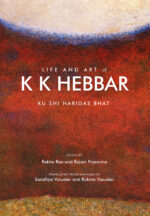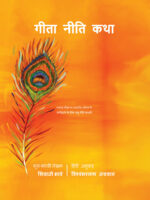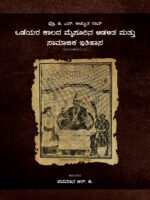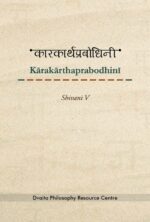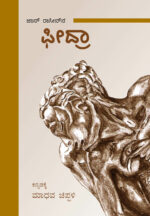Humanitarianism and Democracy (Maanava Dharmah – Prajaaprabhutvam Cheti Shatakadvayam)
₹240.00
Author: M V Nadkarni
These Satkarnas are Prof Nadkarni’s passionate plea for an authentic democratic order which guarantees the rights of every citizen while each citizen participates in it being fully aware of his / her duties. The complementarity of rights and duties is shown to be the essence of genuine democracy.
Interested customers may write to us at mup@manipal.edu about purchasing the book.
| Also available on |
| Category: | Texts in Translation |
|---|
| Author | |
|---|---|
| Format |
Related products
-
Life and Art of K K Hebbar
₹2,000.00Author: Haridas Bhat Editors: Rekha Rao, Rajani Prasanna Translators: Sandhya Vasudev, Rukma Vasudev
K K Hebbar was a trailblazer in Indian art. His contributions to modern Indian art as an artist, teacher, and art administrator are unparalleled. What is ‘Indian’ in modern Indian art has been a subject of discussion since the beginning of the modernist movement. Hebbar’s oeuvre is an answer to that question. It is modern and yet, intensely Indian, both in terms of subjects and treatment. Hebbar remained rooted in his native soil. His line drawings are a treasure of Indian art. No one has surpassed them in their delicacy and lyricism.
This biography is Mr Bhat’s affectionate account of his friend Hebbar’s life and art. The strength of Hebbar’s character comes through in his narration. Integrity and self-discipline were Hebbar’s defining qualities. Arguably, the man was greater than his work. And that makes his story intriguing. This biography of a major artist is a welcome addition to the meagre literature on Indian artists.
Interested customers may write to us at mup@manipal.edu about purchasing the book.
Also available on

-
Geeta Niti Katha
₹850.00Author: Shivaji Bhave, Translator: Vishambharnath Agarwal
यह पुस्तक भगवद् गीता के प्रत्येक श्लोक पर आधारित लघुकथाओं का संकलन है। ये कथाएँ श्री शिवाजी भावे (आचार्य विनोबा भावे के छोटे भाई) ने 1950 के दशक में मराठी में लिखी। इन कथाओं की परम्परा पंचतंत्र और Aesop’s Fables से शुरू होती है।
कथाएँ बहुत ही रोचक और सरल हैं एवं गीता के गहन विषय को सुगमता से समझने में सहायक भी। जीवन के मूल्यों को बहुत ही सरल भाषा में समझाती है जिससे बच्चे बूढ़े और युवा सभी कुछ न कुछ ग्रहण कर सकते हैं।
Interested customers may write to us at mup@manipal.edu about purchasing the book.
-
Akka Mahadevi, the questioning poet-saint
₹255.00Author: D A Shankar
This book presents the mystical ruminations and literary excellence of Akka Mahadevi, the earliest example of a gender-liberated woman writer, credited with the composition of over four hundred and forty remarkably self-explorative Vachanas. Akka Mahadevi represents a powerfully authentic female voice of the radical, egalitarian Sharana Movement, which questioned the socially established barrier between genders and ushered in a world of socio-cultural equality.
In this book, the author explores the questioning spirit intrinsic to Akka Mahadevi’s life and writings, as she questions the widely held conventional norms: the traditional husband-wife relationship, her parents, elders; she questions Basavanna and Allama for their habituated patriarchal manner of speaking, and she bravely questions her personal deity whom she loves and adores. Apart from discerning a credible ‘history’ and background to Akka’s works, this book makes available a rendition of her selectively profound and memorable Vachana in modern English, that crosses the ?the gulf of language and the gulf of time.
Interested readers may write to us at mup@manipal.edu about purchasing the book.
-
Christa Shaka 1800 Ra Modalina Mysooru ithihaasa
₹295.00Author: D S Achuta Rao Translator: S Narendra Prasad
೧೮೦೦ ಕ್ರಿ. ಶ. ದ ಹಿಂದಿನ ಮೈಸೂರು ಇತಿಹಾಸವು ಪ್ರೊ. ಡಿ ಎಸ್ ಅಚ್ಯುತ ರಾವ್ ಅವರ ಜೀವನ ಮತ್ತು ಕೆಲಸದ ಬಗ್ಗೆ. ಮೈಸೂರು ಇತಿಹಾಸದ ಕುರಿತಾದ ಅವರ ಸಂಶೋಧನೆಯು 1940-65ರ ಅವಧಿಯಲ್ಲಿ ಅವರು ಪ್ರಕಟಿಸಿದ ಹತ್ತು ಸೂಚ್ಯಂಕ ಲೇಖನಗಳಿಂದ ಪ್ರತಿನಿಧಿಸುತ್ತದೆ. ಅವರು ಭಾರತದ ಇತಿಹಾಸ ಮತ್ತು ಅದರ ಅದ್ಭುತ ಭೂತಕಾಲವನ್ನು ಸಕ್ರಿಯವಾಗಿ ಜನಪ್ರಿಯಗೊಳಿಸಿದರು. ಮಹಾರಾಜಾಸ್ ಕಾಲೇಜ್ ಹಿಸ್ಟರಿ ಸೊಸೈಟಿ, ಭಾರತದ ವಸಾಹತು ಸಂಶೋಧಕರು ಮತ್ತು ಕನ್ನಡ ವಿಶ್ವಕೋಶದಲ್ಲಿ ಮೈಸೂರು ಸರ್ಕಾರದ ಉಪಕ್ರಮದಿಂದ ಭಾರತೀಯ ಇತಿಹಾಸದಲ್ಲಿ ಉಪಕ್ರಮಗಳನ್ನು ಪ್ರಸ್ತುತಪಡಿಸುವುದರಿಂದ ಅಂತಹ ಮೂರು ಲೇಖನಗಳನ್ನು ಸೇರಿಸಲಾಗಿದೆ. ಎರಡನೇ ಭಾಗದಲ್ಲಿ ಅವರ ಜೀವನಚರಿತ್ರೆಯಲ್ಲಿ, ಅವರ ವಿದ್ಯಾರ್ಥಿಗಳು ಮತ್ತು ಮಕ್ಕಳು ಶಿಕ್ಷಕ ಮತ್ತು ತಂದೆಯಾಗಿ ಅವರ ಜೀವನದ ಬಗ್ಗೆ ಬರೆದಿದ್ದಾರೆ, ಅವರ ಅವಧಿಯ ಸಂದರ್ಭವನ್ನು ಒದಗಿಸಿದ್ದಾರೆ. ಪುಸ್ತಕವು ಕಳೆದ ಶತಮಾನದ ಮಧ್ಯದಲ್ಲಿ ಇತಿಹಾಸ ಸಂಶೋಧನೆಗೆ ಆಸಕ್ತಿದಾಯಕ ವಿಂಡೋವನ್ನು ಪ್ರಸ್ತುತಪಡಿಸುತ್ತದೆ.
Interested readers may write to us at mup@manipal.edu about purchasing the book.
-
Wodeyara Kaalada Mysurina Adalitha matthu Saamajika Ithihasa
₹600.00Author: Pavamana R D, D S Achuta Rao
ವಿಜಯನಗರ ಸಾಮ್ರಾಜ್ಯದ ಉತ್ತರಾಧಿಕಾರಿಗಳೆಂದು ಹೆಸರಾಗಿರುವ ಮೈಸೂರಿನ ಒಡೆಯರು ಕರ್ನಾಟಕದ ಇತಿಹಾಸಕ್ಕೆ ನೀಡಿದ ಕೊಡುಗೆ ಅನನ್ಯವಾದುದು. ರಾಜಕೀಯ ರಂಗದಲ್ಲಿ ಮಾತ್ರವಲ್ಲದೆ, ಸಾಂಸ್ಕೃತಿಕ, ಸಾಹಿತ್ಯಿಕ ಹಾಗೂ ಕಲಾರಂಗಗಳಲ್ಲೂ ಮೈಸೂರು ಅರಸರು ವಿಜಯನಗರದ ಶ್ರೇಷ್ಠ ಪರಂಪರೆಯನ್ನು ಮುಂದುವರೆಸಿದರು. ರಾಜಒಡೆಯರ್, ರಣಧೀರ ಕಂಠೀರವ, ಚಿಕ್ಕದೇವರಾಜ ಒಡೆಯರ್ ಅವರ ಆಳ್ವಿಕೆಯ ಕಾಲಘಟ್ಟದಲ್ಲಿ ಮೈಸೂರು ಸರ್ವಾಂಗೀಣ ಪ್ರಗತಿ ಸಾಧಿಸಿತು. ಈ ವಂಶದ ಮೊದಲ ಪ್ರಮುಖ ಅರಸು ರಾಜ ಒಡೆಯರ್ರಿಂದ ಆರಂಭಿಸಿ ಮೈಸೂರು ಆಂಗ್ಲರ ಅಧೀನವಾಗುವವರೆಗಿನ ಆಡಳಿತ ಹಾಗೂ ಸಾಮಾಜಿಕ ಇತಿಹಾಸ ಇಲ್ಲಿದೆ. ಮೈಸೂರು ಸಂಸ್ಥಾನದ ಎರಡು ಮಹತ್ವಪೂರ್ಣ ಶತಮಾನಗಳ ಕಾಲದ ಆಡಳಿತ, ಕಂದಾಯ ನೀತಿಗಳು, ನ್ಯಾಯಾಡಳಿತ, ಸೈನ್ಯ ವ್ಯವಸ್ಥೆ, ಪ್ರಾಂತೀಯ ಹಾಗೂ ಸ್ಥಳೀಯ ಆಡಳಿತ, ಸಾಮಾಜಿಕ ಜೀವನ ಹಾಗೂ ಧರ್ಮ, ಶಿಕ್ಷಣ, ಸಾಹಿತ್ಯ, ಕಲೆ ಮತ್ತು ವಾಸ್ತುಶಿಲ್ಪ ಮತ್ತು ಆಸ್ಥಾನ ಸಂಸ್ಕೃತಿ ಹೀಗೆ ಬಹುಮುಖೀ ನೆಲೆಗಳ ವಿಸ್ತಾರವಾದ, ಅಧ್ಯಯನಪೂರ್ಣ ಸಂಶೋಧನಾ ವರದಿಯಾಗಿ ಇದು ಸ್ವಾತಂತ್ರೋತ್ತರ ತಲೆಮಾರಿನ ವಿದ್ವಾಂಸರ ಸಂಶೋಧನಾ ವೈಖರಿಗೆ ಒಂದು ಅತ್ಯುತ್ತಮ ಉದಾಹರಣೆ ಎನ್ನಬಹುದು. ಕರ್ನಾಟಕದ ಅದರಲ್ಲೂ ಮೈಸೂರಿನ ಒಡೆಯರ ಇತಿಹಾಸದ ಬಗೆಗೆ ಸಂಶೋಧನೆಗಳು ಇನ್ನೂ ಕಣ್ತೆರೆಯುತ್ತಿದ್ದ ಕಾಲದಲ್ಲಿ ಡಿ. ಎಸ್. ಅಚ್ಯುತರಾಯರ ಈ ಸಂಶೋಧನ ಕಾರ್ಯ ಮಹತ್ವಪೂರ್ಣವಾದುದು. ಅಂದಿಗೆ ಲಭ್ಯವಿದ್ದ ಎಲ್ಲಾ ಬಗೆಯ ಮೂಲ ಹಾಗೂ ಆನುಷಂಗೀಕ ಆಕರಗಳನ್ನು ಬಳಸಿಕೊಂಡು, ಸಂಶೋಧನೆಯ ಎಲ್ಲಾ ಚೌಕಟ್ಟಿನೊಳಗೆ ವಸ್ತುನಿಷ್ಠವಾಗಿ ರೂಫುಗೊಂಡಿದೆ ಈ ಕೃತಿ. ಸಾಮಾಜಿಕ ಇತಿಹಾಸವನ್ನು ಪುನರ್ ರೂಪಿಸುವಾಗಲಂತೂ ಸಮಕಾಲೀನ ಸಾಹಿತ್ಯದ ಎಲ್ಲಾ ರೂಪಗಳನ್ನೂ ಇಲ್ಲಿ ಬಳಸಿಕೊಳ್ಳಲಾಗಿದೆ. ಅಗತ್ಯ ವಿರುವೆಡೆಯಲ್ಲಿ ಒಂದಕ್ಕಿಂತ ಹೆಚ್ಚಿನ ಸಂಖ್ಯೆಯಲ್ಲಿನ ಉಲ್ಲೇಖಗಳು, ಟಿಪ್ಪಣಿಗಳೂ, ವಿವರಣೆಗಳೂ ಈ ಸಂಶೋಧನೆಯ ಮೌಲ್ಯವನ್ನು ಹೆಚ್ಚಿಸಿವೆ. ಸಂಶೋಧನೆಗೆ ಪೂರಕವಾಗಿ ಗ್ರಂಥಋಣ, ನಕ್ಷೆಗಳು, ಸಂಕ್ಷೇಪಾಕ್ಷರಗಳು ಹಾಗೂ ಒಡೆಯರ ವಂಶಾವಳಿ ನೀಡಲಾಗಿದೆ. ಆಧಾರಗಳ ಮೇಲಿನ ಟಿಪ್ಪಣಿಯು ಸಂಶೋಧಕರಿಗೆ ತಮ್ಮ ಕಾರ್ಯಕ್ಷೇತ್ರದ ಮೇಲಿನ ಒಡೆತನದ ದ್ಯೋತಕ. ಅಪಾರ ಸಂಖ್ಯೆಯ ಹಸ್ತಪ್ರತಿಗಳ ಮತ್ತು ಶಾಸನಗಳ ಬಳಕೆ ಈ ಕೃತಿಯ ಹೆಗ್ಗಳಿಕೆ.
Interested readers may write to us at mup@manipal.edu about purchasing the book.
-
Nanna Parni Shaale
₹290.00Author: Thakur S Powdyel Translator: N T Bhat
ನನ್ನ ಪರ್ಣ ಶಾಲೆ ಠಾಕೂರ್ ಎಸ್ ಪಡೆಯಲು ಅವರು ಇಂಗ್ಲಿಷಿನಲ್ಲಿ ರಚಿಸಿದ ಪುಸ್ತಕದ ಕನ್ನಡ ಅನುವಾದ, ಭೂತಾನ್ ರಾಜ್ಯದಲ್ಲಿ ರಾಷ್ಟ್ರವ್ಯಾಪಿಯಾಗಿ ಅಳವಡಿಸಲಾದ ಶಿಕ್ಷಣ ಯೋಜನೆಯನ್ನು ಪೌಡಿಯಲ್ “ಮೈ ಗ್ರೀನ್ ಸ್ಕೂಲ್” ಎಂಬ ಹೆಸರಿನಲ್ಲಿ ವಿವರಿಸಿದ್ದಾರೆ. ಮೂಲದ ಇಂಗ್ಲಿಷ್ ಶೀರ್ಷಿಕೆ ಹೊಂದಿಕೊಳ್ಳುವಂತ ಈ ಅನುವಾದಕ್ಕೆ ಪರ್ಣ ಶಾಲೆ ಎಂಬ ಶೀರ್ಷಿಕೆಯನ್ನು ನೀಡಲಾಗಿದೆ. ವಿದ್ಯಾರ್ಥಿ ವ್ಯಕ್ತಿತ್ವ ವನ್ನು ಸರ್ವಾಂಗೀಣ ವಾಗಿ ರೂಪಿಸುವ ಉದಾತ್ತ ಧೈರ್ಯವನ್ನು ಶಿಕ್ಷಣವು ಹೊಂದಿರಬೇಕೆಂಬುದನ್ನು ಈ ಪುಸ್ತಕದಲ್ಲಿ ಗಂಭೀರವಾಗಿ ಪ್ರತಿ ಪಾದಿಸುತ್ತಾರೆ. ಮನುಷ್ಯನು ಪ್ರಕೃತಿಯೊಂದಿಗೆ ತಾದಾತ್ಮ್ಯ ಭಾವವನ್ನು ಹೊಂದಿಕೊಳ್ಳುವುದು ಸರ್ವಾಂಗೀಣ ವ್ಯಕ್ತಿತ್ವದಲ್ಲಿ ಆಂತರ್ಗತವಾಗಿದೆ. ಶಿಕ್ಷಣಕ್ಕೆ, ಶಿಕ್ಷಣ ಸಂಸ್ಥೆಗಳಿಗೆ ಈ ಲಕ್ಷ್ಯವೂ ಇರಬೇಕೆಂಬುದು ಸ್ವತಸ್ಸಿದ್ದ. ಈ ನಿಟ್ಟಿನಲ್ಲಿ ಉದಾತ್ತ ಶಿಕ್ಷಣ ನೀಡುವ ಶಾಲೆಯನ್ನು ಗ್ರೀನ್ ಸ್ಕೂಲ್ ಎಂದು ಕರೆಯುವುದು ಸರ್ವಥಾ ಸ ರಿ. ಅಂತೆಯೇ ಈ ಶಿಕ್ಷಣ ನೀತಿಯನ್ನು ಭಾರತದಲ್ಲೂ ವ್ಯಾಪಕವಾಗಿ ಅಳವಡಿಸುವುದು ಅಪೇಕ್ಷಣೀಯ.
Also available on

eBook available on

-
Karakarthaprabodhini
₹345.00Author: Shivani V
Kaumudī (water lily) is the primer to study Sanskrit grammar, yet an ardent reader might find it a maze to untangle from its complexities. There is a need of Kaumudī (moonlight) to blossom it and show the light to reach its core. Kārakārthaprabodhinī is such an attempt. Kāraka, a factor that determines the relation between verb and the constituent words of a sentence, enables the reader to understand the intent of the sentence and thus critical discourses too. The Sanskrit grammatical texts and discourses have elaborated on the subtleties of Kāraka. Due to its profundity, there was a need for a lucid writing for the scholars and students for easy comprehension, which can be a reference book. Dr Potti made this possible for the Malayalam readers. Dr Shivani presents it for the Sanskrit fraternity too, with an introduction by Dr Varakhedi.
Interested customers may write to us at mup@manipal.edu about purchasing the book.
Also available on

-
Phedra
₹180.00Translator: Madhava Chippalli
ರಾಸೀನ್ನ ಫೀದ್ರಾ ನಾಟಕವು ಪಾಶ್ಚಿಮಾತ್ಯ ನಾಟಕ ಸಾಹಿತ್ಯದಲ್ಲೇ ಒಂದು ಆಯಕಟ್ಟಿನ ಕೃತಿ. ಗ್ರೀಕ್ ಮತ್ತು ಎಲಿಜಬೆಥನ್ ನಾಟಕಗಳಲ್ಲಿ ಕಾಣಸಿಗದ ಹೊಸ ಬಗೆಯ ಮನೋಲೋಕವೊಂದನ್ನು ತನ್ನ ಪಾತ್ರಗಳಿಗೆ ಧಾರಣೆ ಮಾಡಿಸಿದ ಈ ನಾಟಕವು ಆ ಮೂಲಕವೇ ಈ ಪರಂಪರೆಯಲ್ಲಿ ಮನೋವಿಜ್ಞಾನಕ್ಕೆ ಒಂದು ಖಾಯಂ ಸ್ಥಾನವನ್ನು ಒದಗಿಸಿಕೊಟ್ಟಿತು. ಮುಂದೆ ಬಹುತೇಕ ಪಾಶ್ಚಿಮಾತ್ಯ ನಾಟಕಗಳು ಈ ಪರಂಪರೆಯನ್ನು ಮುಂದುವರಿಸಿದವು; ರಂಗಭೂಮಿಯಲ್ಲೂ ಮನೋಲೋಕವನ್ನು ಮುಂದಕ್ಕೆ ತರುವ ವಿಭಿನ್ನ ಪ್ರಯೋಗಗಳಿಗೆ ಈ ಪರಂಪರೆಯು ಚಾಲ್ತಿ ನೀಡಿತು. ಈ ಸಂಪ್ರದಾಯಕ್ಕೆ ವಿರೋಧಿಯಾದ ಫ್ರಾನ್ಸಿನ ಪ್ರಸಿದ್ಧ ರಂಗಕರ್ಮಿ ಆಂತೋನಿನ್ ಆರ್ತೋನ ಮಾತುಗಳನ್ನು ಕೇಳುವುದಾದರೆ, ಪಾಶ್ಚಿಮಾತ್ಯ ರಂಗಭೂಮಿಯಲ್ಲಿ ‘ಸೈಕಾಲಜಿಯ ದುರ್ಬೀಜ’ ಬಿತ್ತಿದ ಕೃತಿ ಇದು! ಹಾಗಿರುವುದರಿಂದ, ನಾವು ಈ ನಾಟಕವನ್ನು ಹೇಗೇ ಓದಲಿ, ಓದದೆ ಇದ್ದರೆ ಅಷ್ಟರ ಮಟ್ಟಿಗೆ ಪಾಶ್ಚಾತ್ಯ ನಾಟಕ ಸಂಪ್ರದಾಯದ ಅರಿವು ಅಪೂರ್ಣ. ಅಂಥ ಪ್ರಮುಖ ನಾಟಕವೊಂದು ಇನ್ನೂ ಕನ್ನಡಕ್ಕೆ ಬಾರದೆ ಉಳಿದಿತ್ತು; ಆ ಲೋಪವನ್ನು ಈ ಅನುವಾದವು ಸಮರ್ಥವಾಗಿಯೇ ತುಂಬಿಸಿದೆ. ಮೂಲದ ನಿಷ್ಠೆಯೊಂದಿಗೆ ಭಾಷಾಗಾಂಭೀರ್ಯ ಮತ್ತು ಮಾತಿನ ಸುಭಗತೆ ಎರಡನ್ನೂ ಒಟ್ಟಿಗೇ ಹಿಡಿಯಲು ಯತ್ನಿಸಿರುವ ಈ ಅನುವಾದವನ್ನು ನಾನು ತುಂಬು ಮನಸ್ಸಿನಿಂದ ಸ್ವಾಗತಿಸುತ್ತೇನೆ.
Interested readers may write to us at mup@manipal.edu about purchasing the book.


